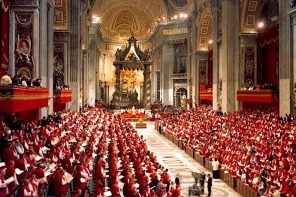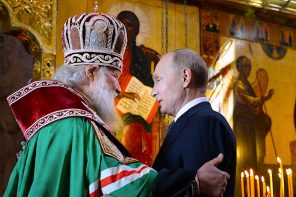Laurie Goodstein reports on the U.S. Conference of Catholic Bishops’ new “religious liberty” initiative, which recasts their opposition to reproductive and LGBT rights “as a struggle for ‘religious liberty’ against a government and a culture that are infringing on the church’s rights.”
USCCB president Archbishop Timothy Dolan charged, according to Goodstein’s report, that “We see in our culture a drive to neuter religion,” adding that “well-financed, well-oiled sectors” were trying “to push religion back into the sacristy.”
Ah, the unnamed well-financed, well-oiled sectors. Who are they? Dolan, whose USCCB had an operating revenue in excess of $220 million last year, according to an audited financial statement, and who garnered an off-the record meeting with the president of the United States to discuss his religious liberty concerns, doesn’t say.
As part of that orchestrated campaign against churches’ religious liberty, Congress did them the favor of exempting them from lobbying disclosure laws. So the Bishops don’t have to make public how much they spent lobbying Congress, who they lobbied, and what they lobbied on. Talk about religious liberty.
The Bishops, it seems, have taken a page from their evangelical friends, who long have attempted to enshrine their belief that rights for LGBT people, for example, infringe on their religious liberty, an argument they press relentlessly in court and in popular culture. In 2007, I wrote a piece about the Alliance Defense Fund and its efforts to undo long-standing jurisprudence on the Establishment Clause, which prohibits government endorsement of a particular religion or religious view, and to elevate the Free Exercise Clause, which guarantees freedom of religion, above it:
Over the past several years, ADF has seized on “viewpoint discrimination” to put the gay rights movement in its cross hairs. Gay rights, in ADF’s view, cannot coexist with its version of Christianity. Anti-harassment codes at schools and universities, gay rights events, and other expressions of freedom or equal rights for LGBT people, necessarily silence Christians, who, ADF insists, are biblically compelled to condemn homosexuality. The “homosexual agenda,” then, is ipso facto anti-Christian. Alan Sears, ADF’s president, told the Family Research Council’s Values Voters Summit last fall that “the homosexual agenda and religious freedom are on a collision course.” He scoffed at what he called “propaganda about so-called oppression” of gays, countering that the “homosexual agenda” not only seeks to silence religious speech but it “probably includes the abolition of marriage.”
For Dolan, Sears’ “collision course” has morphed into a full-scale “neutering.”
There have been numerous instances in which this “infringement of religious liberty” strategy has been deployed; yesterday I wrote about Republican charges that the Obama administration is anti-Catholic for denying federal funding to a USCCB project to help victims of sex trafficking because the USCCB will not provide or refer clients for reproductive health services. This phony charge that rights for others means infringement of Christian (and Catholic) religious liberty has reared its head in every fight over same-sex marriage, in the religious right’s smear campaign against Office of Safe and Drug Free Schools director and anti-bullying activist Kevin Jennings, in the fight over the Stupak amendment and health care reform, and in other instances in which a particular version of Christianity does not get enshrined in the law.
The coalescing between evangelicals and Catholics over this supposed “religious liberty” issue became official with the 2009 release of the Manhattan Declaration, hailed by its authors as a glorious “ecumenism” because evangelicals, Catholics, and even some Eastern Orthodox Christians joined hands in protecting their freedom from the scourges of LGBT rights, reproductive freedom, feminism, and secularism.
At the time, a handful of Catholic bishops signed the document. Now the USCCB seems to have been motivated by its success: it is, after all, touted widely at conservative and religious right gatherings and now claims nearly half a million signers. Religious liberty, the document proclaims, “is grounded in the character of God, the example of Christ, and the inherent freedom and dignity of human beings created in the divine image.”
The driving argument of the document is that LGBT and reproductive rights not only infringe on the rights of Christians, but undermine what the authors claim is the very core of the republic, a divinely inspired political creation whose only loyal citizens claim to be created, and to act, in “the example of Christ.”
If you don’t like that, you’re just an infringer on religious freedom.




